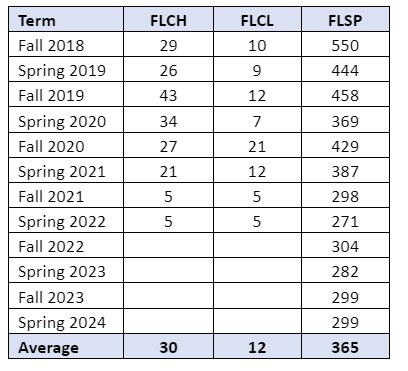DeKALB – Latin is often thought of as a dead language due to its limited usage in the 21st century, but at NIU Latin has been dead for two years.
While it still makes its appearances in classic literature and medical and law terminology, Google adds salt to the burn with its definition of a dead language: “a language which is no longer in everyday spoken use, such as Latin.”
“Spring up to 2022 is the last time we offered anything,” said Robert Brinkmann, dean of the College of Liberal Arts and Sciences.
Brinkmann said the college stopped offering the language because of a lack of enrollment.
“This is something we’ve seen nationwide, that interest in a variety of languages has declined across the country in recent years and all over the United States enrollment in languages is going down,” Brinkmann said.
Latin was not the only language in the department to take a hit. NIU stopped offering Chinese as a language the same year for similar reasons.
While NIU announced in December it had eliminated 25% of its low enrollment classes, Brinkmann said the program was at risk far before that.
“We just have to be good stewards of taxpayers’ dollars, tough taxpayer dollars, so we try not to offer low enrolled courses, period,” Brinkmann said.
The minimum undergraduate class size the college looks for is 15 students, according to Brinkmann. But enrollment numbers from 2018 show that course enrollment was far below that.
NIU’s basic language courses are taught in two year language sequences which include two beginner courses and two intermediate courses.
An eight semester period from Fall 2018 to Spring 2022 revealed the enrollment numbers for the combined four language courses for Latin, Chinese and Spanish.

Since 2018, the maximum number of students enrolled in the Latin program was 21 students with an average of 12 students enrolled each semester, with previous years omitting less.
Chinese courses had a larger average of 30 students enrolled each semester. In comparison, the Spanish courses had enrollment as high as 550 students in the fall of 2018, while on average 365 students were enrolled each semester.
Brinkmann highlighted that enrollment dropped for Spanish as it did for Latin and Chinese. But the staggering difference and the struggle to keep up with minimal class numbers showed where Latin and Chinese dropped off from the 271 students enrolled in Spanish.
Sophomore philosophy major Orin Prchal was interested in taking Latin for his major, but was disappointed when he heard it was not being offered.
“I figured that, I mean it would be helpful for a philosophy major for sure and my dad took it so I was really interested in taking it because it sounds like a fun language,” Prchal said.
Latin is seeped into the United States legal system, originating from the courts of Rome where Latin was the original language. NIU law students often see Latin in their work, but many said they were reluctant toward its usage.
Rabia Amin, a third-year law student, said instead of making legal proceedings more understandable, she believed the language’s usage complicated the process.
“I think that’s like one of the several reasons why the legal field is so intimidating because people have no idea what these words mean,” Amin said. “And I feel like if we just transcribed it and made everything simple English, it would make the courtroom a lot less intimidating and it would make it easier for people to fully understand what’s going on in the courtroom.”
Like Amin, second-year law student, Patrick Bustamante, agreed he did not see the need behind the language in the courtroom.
“At some point people say things because they think it sounds smart without actually truly understanding what they’re referring to or what they mean to be saying and it could be done a lot more simplified and more really a valuable way,” Bustamante said.
While Brinkmann could not confirm if other low enrollment languages were at risk of being dropped from the language department, he said NIU’s South East languages were not in any danger.
“We do teach a lot of the lesser taught Southeast Asian languages, but we do that off of a grant from the federal government,” Brinkmann said. “So some of those courses may be a little bit low enrolled, but we have to offer them because of these federal grants.”
While the language has kissed it’s alma mater farewell, Brinkmann said both Latin and Chinese could be revived if enough interest was shown to fill the classes for multiple semesters.
In the meantime, anyone interested in picking up Latin can join the 1.95 million learners on Duolingo.






















